21 November 2023 In Asia, Blog Post
Achieving a green energy transition in Vietnam’s transport sector through electric mobility
By Le Anh Tuan, Hanoi University of Science and Technology; Nguyen Thi Yen Lien, University of Transport and Communications and Dang Tuyet Ly, NDC Transport Initiative for Asia – GIZ
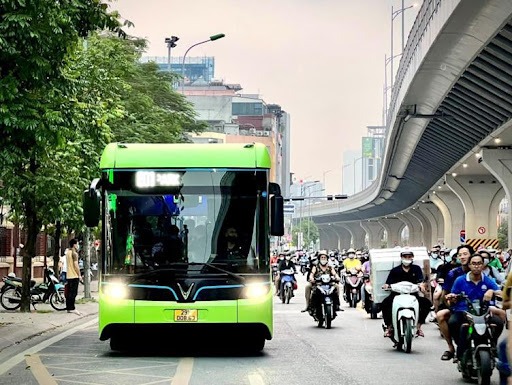
and operated by Vinbus, which are both domestic enterprises. [Source]
A green energy transition in transport to reduce its dependence on fossil fuel is an urgent requirement for humanity. Fossil fuels continued to account for nearly all (96%) of energy used in transport in 2021.[1] The transport sector is a huge source of greenhouse gas (GHG) emissions with an annual average rate of 1.7% from 1990 to 2022, faster than any other end-use sector except for industry (which also grew at around 1.7%).[2] At the same time, fossil fuel is rapidly running out and climate change is getting worse.
A transition to green energy in transport is also crucial to reduce hazardous air pollution and protect human well-being and livelihoods. Transport is a main emission source in cities by air pollutants that are formed during the combustion of fossil fuels in internal combustion engines (ICE), typically as carbon monoxide (CO), carbon dioxide (CO2), nitrogen dioxide (NO2), hydrocarbon (HC) and particulate matter (PM) including ultrafine particles (UFP). In particular, transport emissions of ICE vehicles also lead to the formation of secondary pollutants such as ozone (O3) in the troposphere, known as ground-level ozone. Transport-related air pollution causes a multitude of health issues such as nonallergic respiratory morbidity, allergic illness and asthma, cardiovascular morbidity, cancer, pregnancy and even mortality. The World Health Organization estimated that ambient (outdoor) air pollution caused 4.2 million premature deaths worldwide in 2019.[3]
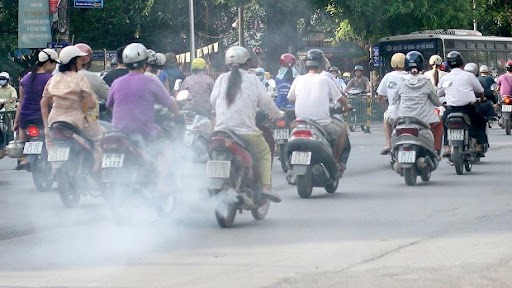
Ambient air pollution relating to road transport in Vietnam. Photo.
Although we have already seen a considerable shift to sustainable, low carbon transport modes in Vietnam, road transport is still a major contributor to greenhouse (GHG) gas emissions and air pollution (Figure 1). The transport sector reportedly contributed approximately 18% of Vietnam’s total GHG emissions (CO2eq).[4] Total transport GHG emissions is projected to reach 89.1 million tons CO2eq and road transport-related emissions will still keep a dominant role by 2030.[5] In 2022, the share of road transport for passenger and freight traffic is about 67.3% and 40.2% respectively.[6] Road motor vehicles in Vietnam are still growing rapidly to meet the growing demand in freight and passenger transport. From 2014 to 2018, the annual average growth rates (AAGR) of cars and motorcycles were 13.7% and 9% respectively.[7]
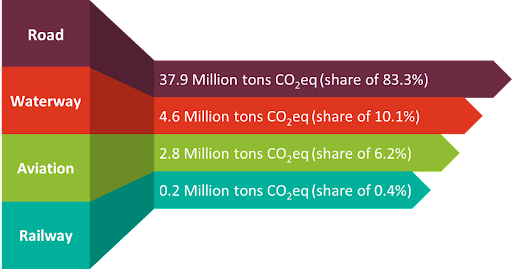
In terms of PM emissions, the annual average concentration of PM2.5 in Vietnam has exceeded the threshold concentration limit recommended by the World Health Organization (WHO) about 5.4 times.[8] About 40% of PM2.5 mass concentrations in Ho Chi Minh City are attributable to road transport, 46.2% of the total PM0.1 mass concentration in Hanoi is also considered to come from road transport.[9] With a high pollutant concentration, the air quality index (IQA) in Vietnam’s big cities is often high, even reduced to a very bad threshold (AQI = 201 – 300), especially in peak hours due to the high traffic density.[10] “Road motor vehicles are lined up in long lines at all peak hours, it makes us feel suffocated” – a citizen living near the road in Thanh Xuan District, Hanoi said.
Reaching a carbon neutral future in Vietnam
The Paris Agreement on climate change, adopted at the COP21 Conference in December 2015, is the first global legal basis binding the responsibilities of all Parties to respond to climate change. At the heart of this process, is the Nationally Determined Contributions (NDCs), which are national climate strategies submitted by countries to reduce GHG emissions, outlining the associated targets and policy measures to achieve these goals.
Since the adoption of the Paris Agreement, Vietnam has worked to reduce GHG emissions, building on its success to mobilise domestic and international resources In its NDC updated in 2022, VietNam stated:[11]
“[We] will develop and implement strong GHG emission reduction measures with its own resources along with the cooperation and support of the international community, especially developed countries, both in terms of finance and technology transfer, including implementing mechanisms under the Paris Agreement, to achieve net zero emissions by 2050”.
Since committing to achieve net-zero emissions by 2050, Vietnam has soon built and issued a roadmap for the green energy transition in the transport sector through Decision 876/QD-TTg in 2022 (Figure 2), which outlines the following actions:[13]
- Gradually phase out the manufacture, assembly, and import of road motor vehicles using fossil fuel.
- By 2050, the share of road motor vehicles using electric and green energy will reach 100%.
- Participating in the Just Energy Transition Partnership (JETP) agreement of the Vietnam Government by the end of 2022 to create a driving force to strongly promote the energy transition process in all fields, including transport.
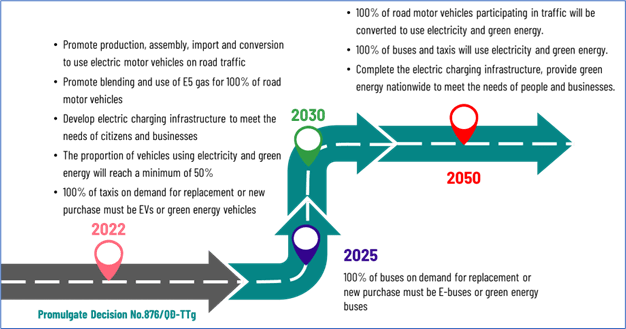
according to Decision 876/QD-TTg.¹⁴
Achieving a green energy transition through electric mobility in Vietnam
Electric vehicles penetrated Vietnam’s market even though the Vietnamese Government has not yet set a target of achieving net zero emissions by 2050 as well as promulgated the green energy transition for the transport sector. Figure 2 demonstrates the penetration of electric vehicles in Vietnam’s market, for both electric 2-wheelers (E2Ws) and electric 4-wheelers (E4Ws).[15]
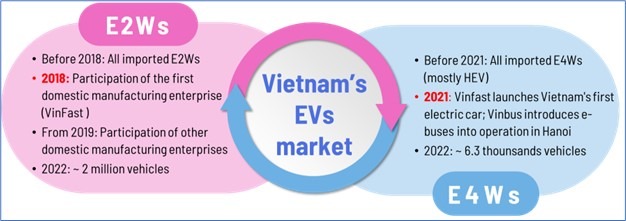
The trends for electric vehicles (EVs) in Vietnam has become stronger since decision 876/QD-TTg was promulgated in 2022, with electric vehicle ownership in Vietnam projected to reach 1 million by 2028, and 3.5 million units by 2040.[17] With a population of around 100 million, relatively low car ownership, steady GDP growth and a quickly expanding middle class, Vietnam will be a promising market for electric vehicles.
Recently, besides the domestic electric car brand VinFast, many major car manufacturers have planned to enter Vietnam. For example, KIA introduced the EV6 model, Hyundai launched the IONIQ 5, and Audi launched the e-Tron GT. Meanwhile, Skoda Auto, the Czech car brand, has signed a cooperation agreement with TC Motor to distribute some electric vehicles in 2023 and start assembling them in 2024. EVone, ZenCar, Autel, etc., are also quickly catching up by providing battery charging solutions to catch the green energy transition wave.[18]
Ms. Tran Thi Bich Ngoc, Head of the Import-Export Tax Policy Department of the Ministry of Finance indicated that “in Vietnam, there is rarely any industry that receives as much tax policy support as the automobile industry. For electric vehicles, the Ministry of Finance has submitted many preferential documents on taxes and fees to the Government and National Assembly”.[19] With a series of government support policies for developing electric vehicles, such as free first-time registration fee and excise tax reduction from 1% to 15%, the electric vehicle industry in Vietnam is expected to grow strongly in due course.[20]
The coming COP28, in November 2023, is expected to be a valuable opportunity for parties to recognise that electric mobility is an important solution for a green energy transition due to its high GHG emission reduction potential and high ratio of renewable energy supply. Vietnam has just issued Power Development Plan 8 which has set the goal of increasing the supply of renewable electric energy. This also favours the growing demand for green energy given the country’s momentum for electric mobility.
Nonetheless, policy and decision makers in Vietnam must remember that electric vehicles are only one part of the broader transformation needed in transport and mobility systems worldwide to achieve decarbonisation and sustainability goals. This transformative change requires an integrated multi-modal, multi-level approach, with enabling policies that also favours active mobility and electrification for public transport, rail, shared mobility, freight and logistics, among others. Much work ahead is needed to embed these efforts into the country’s transport development strategies.
[1] SLOCAT (2023), “Transport, Climate and Sustainability Global Status Report – 3rd edition”. www.tcc-gsr.com.
[2] International Energy Agency (2023), Transport”, www.iea.org/energy-system/transport.
[3] World Health Organization (2022), “Ambient (outdoor) air pollution”, https://bit.ly/3MkpdTS.
[4] Jung Eun Oh, et al. (2019), Addressing Climate Change in Transport: Volume 1 : Pathway to Low-Carbon Transport 2019: The World Bank and Deutsche Gesellschaft für Internationale Zusammenarbeit GmbH.
[5] Ibid.
[6] GSO General Statistics Office of Vietnam (2023). https://www.gso.gov.vn/en/statistical-data/.
[7] Transport Development and Strategy Institute (TDSI) (2018), Transport and Logistics Statistical Yearbook.
[8] Ministry of Transport (2020), Strategic orientation for developing the transport sector to achieve the goal of net-zero in 2050.
[9] IQAir (2019), 2019 world air quality report: Region & City PM2.5 Ranking.
[10] Huong Le and Posada Francisco (2022), Promoting the development of electric vehicles in Vietnam International Council on Clean Transportation;; Trung-Dung Nghiem, et al. (2020), Chemical characterization and source apportionment of ambient nanoparticles: a case study in Hanoi, Vietnam. Environmental Science and Pollution Research. 27: p. 30661-30672.
[11] Ministry of Natural Resources and Environment (2021), Report on the current state of the national environment for the period 2006 – 2021.
[12] Vietnam Government (2022), Nationally determined contributions (NDC) updated 2022.
[13] Grantham Research Institute at LSE and the Sabin Center at Columbia Law School (2022), Climate Change Laws of the World: Decision No. 876/QD-TTg on approving the Action Program for Transition to Green Energy and Mitigation of Carbon Dioxide and Methane Emissions from Transportation.
[14] Ibid.
[15]Ministry of Transport Department for Roads of Vietnam (2023), Current situation and potential for development of electric vehicles in Vietnam.
[16] Ibid.
[17] Vietnam Credit (2023), Prospects for Vietnam’s Electric Vehicle Industry in 2023.
[18] Ibid.
[19] Traffic Newspaper (2022), Workshop on the electric vehicle’s development towards green energy transition.
[20] Ibid.

Le Anh Tuan
Le Anh Tuan is a professor and the Chairman of the University Council at Hanoi University of Science and Technology. He obtained his Bachelor's degree in Internal Combustion Engines from Hanoi University of Science and Technology in 1997, his Master's degree in Internal Combustion Engines from the same university in 1999, and his Ph.D. in Internal Combustion Engines and Thermodynamics from Graz University of Technology in 2005. His research interests include alternative fuels, mixture formation and combustion in internal combustion engines, fuel consumption improvement methods, emission measurements and reduction measures, emission factors, emission models and inventories, driving cycle development, and advanced simulation tools for internal combustion engines. He has published several papers on these topics in reputed journals such as Sustainable Energy Technologies and Assessments, International Journal of Energy Research, and Energy Sources, Part A: Recovery, Utilization, and Environmental Effects.

Nguyen Thi Yen Lien
Nguyen Thi Yen Lien is a lecturer at the Faculty of Transport Safety and Environment, University of Transport and Communications in Vietnam. She has published several research papers on topics such as emission inventory, vehicle emission, driving cycle, and country-specific emission factors. Her research work includes developing the typical driving cycle for buses in Hanoi, Vietnam, and collecting and processing on-road instantaneous data of fuel consumption and speed for motorcycles. She has also worked on the impact of traffic emissions on fine particulate matter and carbon monoxide levels in Hanoi through COVID-19 social distancing periods.

Dang Tuyet Ly
Dang Tuyet Ly is a transport and climate change expert based in Hanoi, Vietnam. She is the team leader of the Vietnam component of the NDC Transport Initiative for Asia project. At GIZ, she leads climate change policies in the transport sector and explores opportunities for climate finance in the sector. Her responsibilities include supporting the Ministry of Transport and Ministry of Planning and Investment in developing low carbon transportation strategies as well as mainstreaming and mobilizing funding sources for climate change activities